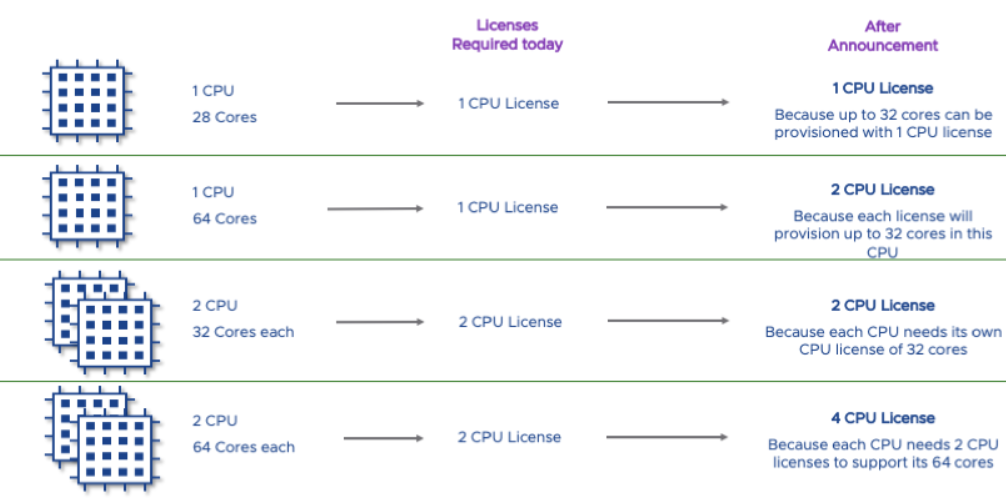Broadcom's Extreme VMware Price Increase: AT&T's Concerns

Table of Contents
AT&T's Public Outcry and Concerns
AT&T's vocal opposition to Broadcom's VMware price increase highlights the severity of the situation. The telecom giant has publicly expressed significant concerns about the substantial impact on its budget and operations. Their statements reflect a widespread apprehension among large enterprises heavily reliant on VMware solutions. AT&T's worries extend beyond mere cost increases; they encompass potential service disruptions and a significant competitive disadvantage compared to companies that might secure more favorable VMware licensing deals.
- Increased operational costs for AT&T: The price hike directly translates to a substantial increase in AT&T's IT expenditure, potentially impacting profitability and investment in other critical areas.
- Potential need for service reductions or feature limitations: To offset the increased VMware licensing costs, AT&T might be forced to cut back on services or limit features offered to customers.
- Competitive pressure from companies with lower VMware costs: Competitors might gain a significant advantage by securing better deals on VMware licensing, potentially impacting AT&T's market share and competitiveness.
Analysis of Broadcom's VMware Pricing Strategy
Broadcom's rationale behind the VMware price increase remains a subject of much speculation. Several factors likely contribute to this decision. The increased R&D investment required to maintain and enhance VMware's offerings could be a significant factor. Furthermore, Broadcom, as the new owner, likely aims to maximize returns on its substantial investment through increased profitability. However, this strategy carries significant risk. The aggressive price hike could attract unwanted regulatory scrutiny, raising potential antitrust concerns.
- Increased R&D costs for VMware: Maintaining VMware's position at the forefront of virtualization technology requires ongoing investment in research and development.
- Broadcom's aim to maximize returns after acquisition: Broadcom's primary objective is to generate substantial profits from its acquisition of VMware.
- Potential scrutiny from regulatory bodies: The significant price increase could attract the attention of antitrust regulators who might investigate potential anti-competitive practices.
Impact on Other VMware Customers
The impact of Broadcom's VMware price increase extends far beyond AT&T. Large enterprises, reliant on VMware's virtualization solutions for critical infrastructure, face similar challenges. Smaller businesses, already operating with tighter budgets, could be disproportionately affected. This could potentially lead to a broader industry backlash, pressuring Broadcom to justify its pricing strategy. Furthermore, the price hike could accelerate the adoption of alternative virtualization solutions, potentially disrupting VMware's market dominance.
- Increased IT budgets for businesses: The price increase forces businesses to allocate more resources to their IT budgets, potentially squeezing other areas.
- Potential migration to alternative virtualization platforms: The price hike could trigger a shift towards open-source alternatives or other virtualization providers.
- Pressure on VMware to justify the price increase: The industry backlash could force VMware to justify its pricing and potentially lead to adjustments in its licensing model.
The Future of VMware Licensing and Pricing
The long-term implications of Broadcom's pricing strategy remain uncertain. We might see adjustments in VMware's licensing models, including revised licensing tiers or a shift towards subscription-based services. Increased competition from open-source alternatives and other virtualization providers is inevitable. The outcome will significantly impact the broader cloud computing market, potentially reshaping the landscape of enterprise virtualization.
- Potential for revised licensing tiers: VMware might introduce new licensing tiers to cater to different customer needs and budgets.
- Increased competition from open-source alternatives: Open-source virtualization solutions could experience a surge in adoption due to cost considerations.
- Long-term impact on the cloud computing market: The price increase and resulting market dynamics could influence the direction and competitiveness of the cloud computing market.
Conclusion: Navigating the Fallout from Broadcom's VMware Price Increase
Broadcom's VMware price increase has sparked significant concerns, particularly amongst large enterprises like AT&T. The price hike reflects Broadcom's strategy to maximize returns post-acquisition but carries the risk of regulatory scrutiny and a shift towards alternative solutions. The broader impact on the market remains to be seen, with potential for revised licensing models, increased competition, and significant changes in the cloud computing landscape. Stay updated on the evolving situation surrounding Broadcom's VMware price increase and explore alternative virtualization strategies to mitigate potential cost increases.

Featured Posts
-
 Met Gala 2025 Will Naomi Campbell Attend Amidst Wintour Dispute
May 26, 2025
Met Gala 2025 Will Naomi Campbell Attend Amidst Wintour Dispute
May 26, 2025 -
 X Et L Extreme Droite Europeenne L Influence D Elon Musk
May 26, 2025
X Et L Extreme Droite Europeenne L Influence D Elon Musk
May 26, 2025 -
 Real Madrid Bajo Florentino Perez Analisis De Su Etapa Dorada
May 26, 2025
Real Madrid Bajo Florentino Perez Analisis De Su Etapa Dorada
May 26, 2025 -
 The Michael Schumacher Legacy Examining Claims Of Unpopularity
May 26, 2025
The Michael Schumacher Legacy Examining Claims Of Unpopularity
May 26, 2025 -
 Dr Terrors House Of Horrors History Attractions And Reviews
May 26, 2025
Dr Terrors House Of Horrors History Attractions And Reviews
May 26, 2025
